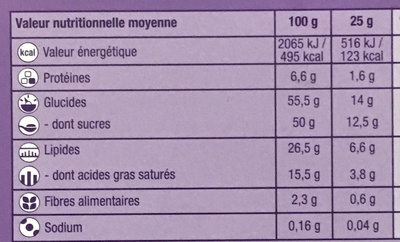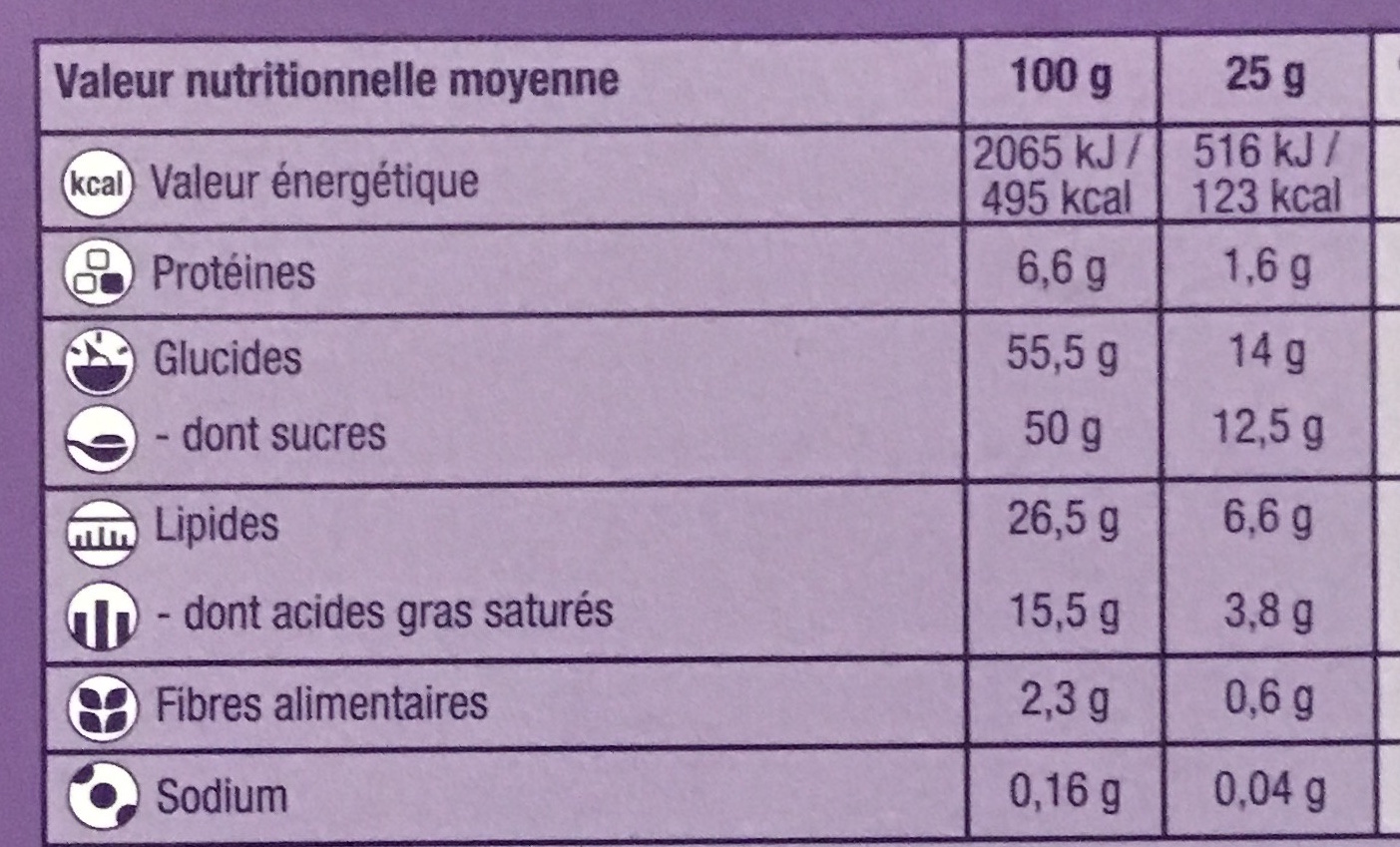Help us make food transparency the norm!
As a non-profit organization, we depend on your donations to continue informing consumers around the world about what they eat.
The food revolution starts with you!
Tendres Moments Moelleux Chocolat - Milka - 120 g
Tendres Moments Moelleux Chocolat - Milka - 120 g
This product page is not complete. You can help to complete it by editing it and adding more data from the photos we have, or by taking more photos using the app for Android or iPhone/iPad. Thank you!
×
Barcode: 7622300612450 (EAN / EAN-13)
Common name: Génoise (15%) au chocolat recouverte d'une crème confiseur (26%) au cacao, enrobée de chocolat au lait du pays alpin
Quantity: 120 g
Packaging: Cardboard
Brands: Milka
Categories: Snacks, Sweet snacks, Cocoa and its products, Chocolates, Milk chocolates
Labels, certifications, awards: fr:Saveurs de l'Année, fr:Saveurs de l'Année 2012, Saveurs-de-l-annee-france
Manufacturing or processing places: Union Européenne
Countries where sold: France
Matching with your preferences
Health
Ingredients
-
41 ingredients
: Sucre, beurre de cacao, lait concentré sucré (lait, sucre), poudre de lait écrémé, pâte de cacao, huiles végétales, farine de froment, lactosérum en poudre, œufs, beurre concentré, cacao en poudre fortement dégraissé, sirop de glucose-fructose, humectant (E422, E1103), noisettes, émulsifiants (lécithine de soja, E476, E475, E471, E433, lécithine de tournesol), alcool de bouche, arômes, huile végétale hydrogénée, sel, poudres à lever (E450, E500), acidifiant (E330, E300), conservateur (E202), stabilisant (E407), épaississant (E415).Allergens: Eggs, Gluten, Milk, Nuts, SoybeansTraces: Nuts
Food processing
-
Ultra processed foods
Elements that indicate the product is in the 4 - Ultra processed food and drink products group:
- Additive: E322 - Lecithins
- Additive: E407 - Carrageenan
- Additive: E415 - Xanthan gum
- Additive: E422 - Glycerol
- Additive: E433 - Polyoxyethylene sorbitan monooleate
- Additive: E450 - Diphosphates
- Additive: E471 - Mono- and diglycerides of fatty acids
- Additive: E475 - Polyglycerol esters of fatty acids
- Additive: E476 - Polyglycerol polyricinoleate
- Ingredient: Emulsifier
- Ingredient: Flavouring
- Ingredient: Glucose
- Ingredient: Humectant
- Ingredient: Hydrogenated oil
- Ingredient: Thickener
- Ingredient: Whey
Food products are classified into 4 groups according to their degree of processing:
- Unprocessed or minimally processed foods
- Processed culinary ingredients
- Processed foods
- Ultra processed foods
The determination of the group is based on the category of the product and on the ingredients it contains.
Additives
-
E1103 - Invertase
Invertase: Invertase is an enzyme that catalyzes the hydrolysis -breakdown- of sucrose -table sugar- into fructose and glucose. Alternative names for invertase include EC 3.2.1.26, saccharase, glucosucrase, beta-h-fructosidase, beta-fructosidase, invertin, sucrase, maxinvert L 1000, fructosylinvertase, alkaline invertase, acid invertase, and the systematic name: beta-fructofuranosidase. The resulting mixture of fructose and glucose is called inverted sugar syrup. Related to invertases are sucrases. Invertases and sucrases hydrolyze sucrose to give the same mixture of glucose and fructose. Invertases cleave the O-C-fructose- bond, whereas the sucrases cleave the O-C-glucose- bond.For industrial use, invertase is usually derived from yeast. It is also synthesized by bees, which use it to make honey from nectar. Optimal temperature at which the rate of reaction is at its greatest is 60 °C and an optimum pH of 4.5. Typically, sugar is inverted with sulfuric acid.Source: Wikipedia
-
E202 - Potassium sorbate
Potassium sorbate (E202) is a synthetic food preservative commonly used to extend the shelf life of various food products.
It works by inhibiting the growth of molds, yeast, and some bacteria, preventing spoilage. When added to foods, it helps maintain their freshness and quality.
Some studies have shown that when combined with nitrites, potassium sorbate have genotoxic activity in vitro. However, potassium sorbate is generally recognized as safe (GRAS) by regulatory authorities.
-
E322 - Lecithins
Lecithins are natural compounds commonly used in the food industry as emulsifiers and stabilizers.
Extracted from sources like soybeans and eggs, lecithins consist of phospholipids that enhance the mixing of oil and water, ensuring smooth textures in various products like chocolates, dressings, and baked goods.
They do not present any known health risks.
-
E322i - Lecithin
Lecithins are natural compounds commonly used in the food industry as emulsifiers and stabilizers.
Extracted from sources like soybeans and eggs, lecithins consist of phospholipids that enhance the mixing of oil and water, ensuring smooth textures in various products like chocolates, dressings, and baked goods.
They do not present any known health risks.
-
E330 - Citric acid
Citric acid is a natural organic acid found in citrus fruits such as lemons, oranges, and limes.
It is widely used in the food industry as a flavor enhancer, acidulant, and preservative due to its tart and refreshing taste.
Citric acid is safe for consumption when used in moderation and is considered a generally recognized as safe (GRAS) food additive by regulatory agencies worldwide.
-
E407 - Carrageenan
Carrageenan (E407), derived from red seaweed, is widely employed in the food industry as a gelling, thickening, and stabilizing agent, notably in dairy and meat products.
It can exist in various forms, each imparting distinct textural properties to food.
However, its degraded form, often referred to as poligeenan, has raised health concerns due to its potential inflammatory effects and its classification as a possible human carcinogen (Group 2B) by the International Agency for Research on Cancer (IARC).
Nevertheless, food-grade carrageenan has been deemed safe by various regulatory bodies when consumed in amounts typically found in food.
-
E415 - Xanthan gum
Xanthan gum (E415) is a natural polysaccharide derived from fermented sugars, often used in the food industry as a thickening and stabilizing agent.
This versatile food additive enhances texture and prevents ingredient separation in a wide range of products, including salad dressings, sauces, and gluten-free baked goods.
It is considered safe for consumption even at high intake amounts.
-
E422 - Glycerol
Glycerol: Glycerol -; also called glycerine or glycerin; see spelling differences- is a simple polyol compound. It is a colorless, odorless, viscous liquid that is sweet-tasting and non-toxic. The glycerol backbone is found in all lipids known as triglycerides. It is widely used in the food industry as a sweetener and humectant and in pharmaceutical formulations. Glycerol has three hydroxyl groups that are responsible for its solubility in water and its hygroscopic nature.Source: Wikipedia
-
E433 - Polyoxyethylene sorbitan monooleate
Polysorbate 80: Polysorbate 80 is a nonionic surfactant and emulsifier often used in foods and cosmetics. This synthetic compound is a viscous, water-soluble yellow liquid.Source: Wikipedia
-
E450 - Diphosphates
Diphosphates (E450) are food additives often utilized to modify the texture of products, acting as leavening agents in baking and preventing the coagulation of canned food.
These salts can stabilize whipped cream and are also found in powdered products to maintain their flow properties. They are commonly present in baked goods, processed meats, and soft drinks.
Derived from phosphoric acid, they're part of our daily phosphate intake, which often surpasses recommended levels due to the prevalence of phosphates in processed foods and drinks.
Excessive phosphate consumption is linked to health issues, such as impaired kidney function and weakened bone health. Though diphosphates are generally regarded as safe when consumed within established acceptable daily intakes, it's imperative to monitor overall phosphate consumption to maintain optimal health.
-
E471 - Mono- and diglycerides of fatty acids
Mono- and diglycerides of fatty acids (E471), are food additives commonly used as emulsifiers in various processed foods.
These compounds consist of glycerol molecules linked to one or two fatty acid chains, which help stabilize and blend water and oil-based ingredients. E471 enhances the texture and shelf life of products like margarine, baked goods, and ice cream, ensuring a smooth and consistent texture.
It is generally considered safe for consumption within established regulatory limits.
-
E476 - Polyglycerol polyricinoleate
Polyglycerol polyricinoleate: Polyglycerol polyricinoleate -PGPR-, E476, is an emulsifier made from glycerol and fatty acids -usually from castor bean, but also from soybean oil-. In chocolate, compound chocolate and similar coatings, PGPR is mainly used with another substance like lecithin to reduce viscosity. It is used at low levels -below 0.5%-, and works by decreasing the friction between the solid particles -e.g. cacao, sugar, milk- in molten chocolate, reducing the yield stress so that it flows more easily, approaching the behaviour of a Newtonian fluid. It can also be used as an emulsifier in spreads and in salad dressings, or to improve the texture of baked goods. It is made up of a short chain of glycerol molecules connected by ether bonds, with ricinoleic acid side chains connected by ester bonds. PGPR is a yellowish, viscous liquid, and is strongly lipophilic: it is soluble in fats and oils and insoluble in water and ethanol.Source: Wikipedia
-
E500 - Sodium carbonates
Sodium carbonates (E500) are compounds commonly used in food preparation as leavening agents, helping baked goods rise by releasing carbon dioxide when they interact with acids.
Often found in baking soda, they regulate the pH of food, preventing it from becoming too acidic or too alkaline. In the culinary world, sodium carbonates can also enhance the texture and structure of foods, such as noodles, by modifying the gluten network.
Generally recognized as safe, sodium carbonates are non-toxic when consumed in typical amounts found in food.
Ingredients analysis
-
May contain palm oil
Ingredients that may contain palm oil: Vegetable oil, Butterfat, E471, E433, Hydrogenated vegetable oil
-
Non-vegan
Non-vegan ingredients: Sweetened condensed milk, Milk, Skimmed milk powder, Whey powder, Egg, ButterfatSome ingredients could not be recognized.
We need your help!
You can help us recognize more ingredients and better analyze the list of ingredients for this product and others:
- Edit this product page to correct spelling mistakes in the ingredients list, and/or to remove ingredients in other languages and sentences that are not related to the ingredients.
- Add new entries, synonyms or translations to our multilingual lists of ingredients, ingredient processing methods, and labels.
If you would like to help, join the #ingredients channel on our Slack discussion space and/or learn about ingredients analysis on our wiki. Thank you!
-
Vegetarian status unknown
Unrecognized ingredients: fr:cacao-en-poudre-fortement-degraisse, fr:alcool-de-boucheSome ingredients could not be recognized.
We need your help!
You can help us recognize more ingredients and better analyze the list of ingredients for this product and others:
- Edit this product page to correct spelling mistakes in the ingredients list, and/or to remove ingredients in other languages and sentences that are not related to the ingredients.
- Add new entries, synonyms or translations to our multilingual lists of ingredients, ingredient processing methods, and labels.
If you would like to help, join the #ingredients channel on our Slack discussion space and/or learn about ingredients analysis on our wiki. Thank you!
-
Details of the analysis of the ingredients
We need your help!
Some ingredients could not be recognized.
We need your help!
You can help us recognize more ingredients and better analyze the list of ingredients for this product and others:
- Edit this product page to correct spelling mistakes in the ingredients list, and/or to remove ingredients in other languages and sentences that are not related to the ingredients.
- Add new entries, synonyms or translations to our multilingual lists of ingredients, ingredient processing methods, and labels.
If you would like to help, join the #ingredients channel on our Slack discussion space and/or learn about ingredients analysis on our wiki. Thank you!
: Sucre, beurre de cacao, lait concentré sucré (lait, sucre), poudre de lait écrémé, pâte de cacao, huiles végétales, farine de froment, lactosérum en poudre, œufs, beurre concentré, cacao en poudre fortement dégraissé, sirop de glucose-fructose, humectant (e422, e1103), noisettes, émulsifiants (lécithine de soja, e476, e475, e471, e433, lécithine de tournesol), alcool de bouche, arômes, huile végétale hydrogénée, sel, poudres à lever (e450, e500), acidifiant (e330, e300), conservateur (e202), stabilisant (e407), épaississant (e415)- Sucre -> en:sugar - vegan: yes - vegetarian: yes - ciqual_proxy_food_code: 31016 - percent_min: 4.16666666666667 - percent_max: 100
- beurre de cacao -> en:cocoa-butter - vegan: yes - vegetarian: yes - ciqual_food_code: 16030 - percent_min: 0 - percent_max: 50
- lait concentré sucré -> en:sweetened-condensed-milk - vegan: no - vegetarian: yes - ciqual_proxy_food_code: 19051 - percent_min: 0 - percent_max: 33.3333333333333
- lait -> en:milk - vegan: no - vegetarian: yes - ciqual_proxy_food_code: 19051 - percent_min: 0 - percent_max: 33.3333333333333
- sucre -> en:sugar - vegan: yes - vegetarian: yes - ciqual_proxy_food_code: 31016 - percent_min: 0 - percent_max: 16.6666666666667
- poudre de lait écrémé -> en:skimmed-milk-powder - vegan: no - vegetarian: yes - ciqual_food_code: 19054 - percent_min: 0 - percent_max: 25
- pâte de cacao -> en:cocoa-paste - vegan: yes - vegetarian: yes - ciqual_proxy_food_code: 16030 - percent_min: 0 - percent_max: 20
- huiles végétales -> en:vegetable-oil - vegan: yes - vegetarian: yes - from_palm_oil: maybe - percent_min: 0 - percent_max: 16.6666666666667
- farine de froment -> en:wheat-flour - vegan: yes - vegetarian: yes - ciqual_proxy_food_code: 9410 - percent_min: 0 - percent_max: 14.2857142857143
- lactosérum en poudre -> en:whey-powder - vegan: no - vegetarian: maybe - percent_min: 0 - percent_max: 12.5
- œufs -> en:egg - vegan: no - vegetarian: yes - ciqual_food_code: 22000 - percent_min: 0 - percent_max: 11.1111111111111
- beurre concentré -> en:butterfat - vegan: no - vegetarian: yes - from_palm_oil: maybe - ciqual_food_code: 16401 - percent_min: 0 - percent_max: 10
- cacao en poudre fortement dégraissé -> fr:cacao-en-poudre-fortement-degraisse - percent_min: 0 - percent_max: 9.09090909090909
- sirop de glucose-fructose -> en:glucose-fructose-syrup - vegan: yes - vegetarian: yes - ciqual_food_code: 31077 - percent_min: 0 - percent_max: 8.33333333333333
- humectant -> en:humectant - percent_min: 0 - percent_max: 7.69230769230769
- e422 -> en:e422 - vegan: maybe - vegetarian: maybe - percent_min: 0 - percent_max: 7.69230769230769
- e1103 -> en:e1103 - vegan: yes - vegetarian: yes - percent_min: 0 - percent_max: 3.84615384615385
- noisettes -> en:hazelnut - vegan: yes - vegetarian: yes - ciqual_food_code: 15004 - percent_min: 0 - percent_max: 7.14285714285714
- émulsifiants -> en:emulsifier - percent_min: 0 - percent_max: 6.66666666666667
- lécithine de soja -> en:soya-lecithin - vegan: yes - vegetarian: yes - ciqual_food_code: 42200 - percent_min: 0 - percent_max: 6.66666666666667
- e476 -> en:e476 - vegan: yes - vegetarian: yes - percent_min: 0 - percent_max: 3.33333333333333
- e475 -> en:e475 - vegan: maybe - vegetarian: maybe - percent_min: 0 - percent_max: 2.22222222222222
- e471 -> en:e471 - vegan: maybe - vegetarian: maybe - from_palm_oil: maybe - percent_min: 0 - percent_max: 1.66666666666667
- e433 -> en:e433 - vegan: maybe - vegetarian: maybe - from_palm_oil: maybe - percent_min: 0 - percent_max: 1.33333333333333
- lécithine de tournesol -> en:sunflower-lecithin - vegan: yes - vegetarian: yes - percent_min: 0 - percent_max: 1.11111111111111
- alcool de bouche -> fr:alcool-de-bouche - percent_min: 0 - percent_max: 6.25
- arômes -> en:flavouring - vegan: maybe - vegetarian: maybe - percent_min: 0 - percent_max: 5
- huile végétale hydrogénée -> en:hydrogenated-vegetable-oil - vegan: yes - vegetarian: yes - from_palm_oil: maybe - percent_min: 0 - percent_max: 5
- sel -> en:salt - vegan: yes - vegetarian: yes - ciqual_food_code: 11058 - percent_min: 0 - percent_max: 0.4064
- poudres à lever -> en:raising-agent - percent_min: 0 - percent_max: 0.4064
- e450 -> en:e450 - vegan: yes - vegetarian: yes - percent_min: 0 - percent_max: 0.4064
- e500 -> en:e500 - vegan: yes - vegetarian: yes - percent_min: 0 - percent_max: 0.2032
- acidifiant -> en:acid - percent_min: 0 - percent_max: 0.4064
- e330 -> en:e330 - vegan: yes - vegetarian: yes - percent_min: 0 - percent_max: 0.4064
- e300 -> en:e300 - vegan: yes - vegetarian: yes - percent_min: 0 - percent_max: 0.2032
- conservateur -> en:preservative - percent_min: 0 - percent_max: 0.4064
- e202 -> en:e202 - vegan: yes - vegetarian: yes - percent_min: 0 - percent_max: 0.4064
- stabilisant -> en:stabiliser - percent_min: 0 - percent_max: 0.4064
- e407 -> en:e407 - vegan: yes - vegetarian: yes - percent_min: 0 - percent_max: 0.4064
- épaississant -> en:thickener - percent_min: 0 - percent_max: 0.4064
- e415 -> en:e415 - vegan: yes - vegetarian: yes - percent_min: 0 - percent_max: 0.4064
Nutrition
-
Bad nutritional quality
⚠ ️Warning: the amount of fruits, vegetables and nuts is not specified on the label, it was estimated from the list of ingredients: 0This product is not considered a beverage for the calculation of the Nutri-Score.
Positive points: 2
- Proteins: 4 / 5 (value: 6.6, rounded value: 6.6)
- Fiber: 2 / 5 (value: 2.3, rounded value: 2.3)
- Fruits, vegetables, nuts, and colza/walnut/olive oils: 0 / 5 (value: 0.0058492024739536, rounded value: 0)
Negative points: 27
- Energy: 6 / 10 (value: 2065, rounded value: 2065)
- Sugars: 10 / 10 (value: 50, rounded value: 50)
- Saturated fat: 10 / 10 (value: 15.5, rounded value: 15.5)
- Sodium: 1 / 10 (value: 162.56, rounded value: 162.6)
The points for proteins are not counted because the negative points are greater or equal to 11.
Nutritional score: (27 - 2)
Nutri-Score:
-
Nutrient levels
-
Fat in high quantity (26.5%)
What you need to know- A high consumption of fat, especially saturated fats, can raise cholesterol, which increases the risk of heart diseases.
Recommendation: Limit the consumption of fat and saturated fat- Choose products with lower fat and saturated fat content.
-
Saturated fat in high quantity (15.5%)
What you need to know- A high consumption of fat, especially saturated fats, can raise cholesterol, which increases the risk of heart diseases.
Recommendation: Limit the consumption of fat and saturated fat- Choose products with lower fat and saturated fat content.
-
Sugars in high quantity (50%)
What you need to know- A high consumption of sugar can cause weight gain and tooth decay. It also augments the risk of type 2 diabetes and cardio-vascular diseases.
Recommendation: Limit the consumption of sugar and sugary drinks- Sugary drinks (such as sodas, fruit beverages, and fruit juices and nectars) should be limited as much as possible (no more than 1 glass a day).
- Choose products with lower sugar content and reduce the consumption of products with added sugars.
-
Salt in moderate quantity (0.406%)
What you need to know- A high consumption of salt (or sodium) can cause raised blood pressure, which can increase the risk of heart disease and stroke.
- Many people who have high blood pressure do not know it, as there are often no symptoms.
- Most people consume too much salt (on average 9 to 12 grams per day), around twice the recommended maximum level of intake.
Recommendation: Limit the consumption of salt and salted food- Reduce the quantity of salt used when cooking, and don't salt again at the table.
- Limit the consumption of salty snacks and choose products with lower salt content.
-
-
Nutrition facts
Nutrition facts As sold
for 100 g / 100 mlAs sold
per serving (25 g)Compared to: Milk chocolates Energy 2,065 kj
(495 kcal)516 kj
(124 kcal)-10% Fat 26.5 g 6.62 g -23% Saturated fat 15.5 g 3.88 g -20% Carbohydrates 55.5 g 13.9 g +6% Sugars 50 g 12.5 g +2% Fiber 2.3 g 0.575 g -11% Proteins 6.6 g 1.65 g -8% Salt 0.406 g 0.102 g +77% Fruits‚ vegetables‚ nuts and rapeseed‚ walnut and olive oils (estimate from ingredients list analysis) 0.006 % 0.006 %
Environment
-
Eco-Score D - High environmental impact
⚠ ️Select a country in order to include the full impact of transportation.The Eco-Score is an experimental score that summarizes the environmental impacts of food products.→ The Eco-Score was initially developped for France and it is being extended to other European countries. The Eco-Score formula is subject to change as it is regularly improved to make it more precise and better suited to each country.Life cycle analysis
-
Average impact of products of the same category: D (Score: 38/100)
Category: Milk chocolate bar
Category: Milk chocolate bar
- PEF environmental score: 0.78 (the lower the score, the lower the impact)
- including impact on climate change: 12.74 kg CO2 eq/kg of product
Stage Impact Agriculture
43.5 %Processing
50.8 %Packaging
1.3 %Transportation
3.7 %Distribution
0.6 %Consumption
0.0 %
Bonuses and maluses
-
Missing origins of ingredients information
Malus: -5
⚠ ️ The origins of the ingredients of this product are not indicated.
If they are indicated on the packaging, you can modify the product sheet and add them.
If you are the manufacturer of this product, you can send us the information with our free platform for producers.
-
Packaging with a low impact
Malus: -1
Shape Material Recycling Impact Unknown Cardboard Low ⚠ ️ The information about the packaging of this product is not sufficiently precise (exact shapes and materials of all components of the packaging).⚠ ️ For a more precise calculation of the Eco-Score, you can modify the product page and add them.
If you are the manufacturer of this product, you can send us the information with our free platform for producers.
Eco-Score for this product
-
Impact for this product: D (Score: 32/100)
Product: Tendres Moments Moelleux Chocolat - Milka - 120 g
Life cycle analysis score: 38
Sum of bonuses and maluses: -6
Final score: 32/100
-
Carbon footprint
-
Equal to driving 6.6 km in a petrol car
1274 g CO² per 100g of product
The carbon emission figure comes from ADEME's Agribalyse database, for the category: Milk chocolate bar (Source: ADEME Agribalyse Database)
Stage Impact Agriculture
31.2 %Processing
65.4 %Packaging
0.8 %Transportation
2.4 %Distribution
0.1 %Consumption
0.0 %
Packaging
-
Packaging with a low impact
-
Packaging parts
(Cardboard)
-
Packaging materials
Material % Packaging weight Packaging weight per 100 g of product Paper or cardboard
-
Transportation
-
Origins of ingredients
Missing origins of ingredients information
⚠ ️ The origins of the ingredients of this product are not indicated.
If they are indicated on the packaging, you can modify the product sheet and add them.
If you are the manufacturer of this product, you can send us the information with our free platform for producers.Add the origins of ingredients for this product Add the origins of ingredients for this product
Report a problem
-
Incomplete or incorrect information?
Category, labels, ingredients, allergens, nutritional information, photos etc.
If the information does not match the information on the packaging, please complete or correct it. Open Food Facts is a collaborative database, and every contribution is useful for all.
Data sources
Product added on by openfoodfacts-contributors
Last edit of product page on by quechoisir.
Product page also edited by elttor, packbot, tacite.










